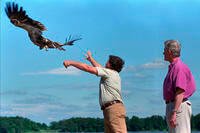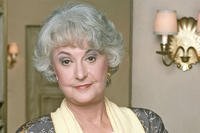In Tom Brokaw's "The Greatest Generation," President George Bush recounted his experiences reading "the other guys' mail" -- letters written by the enlisted men under his command that the young naval lieutenant was required to censor: "As I did my duty … I learned about … the diversity of our great country. I gained an insight into the lives of my shipmates, and I felt richer."
Bush's words reminded Brokaw, as they perhaps will many Americans, of the leveling force World War II was for its players. Bush, son of a powerful senator and accustomed to the privileges of wealth, found himself serving with men from every state, every race, every creed, and every socioeconomic background. What's more, he had volunteered for this service rather than waiting for his draft number to be called, a service he considered "a duty, yes, but truly an honor."
Bush believes that honor means he is "owed nothing" by his country. The "exceptionally good pilot" (his executive officer's words), who was for a time the Navy's youngest, does not seem to consider himself a hero, even as his Distinguished Flying Cross citation praises his "heroism and extraordinary achievement." When Bush remembers the day he was shot down, he is more likely to talk about his two comrades who died than to describe his own actions.
On Sept. 2, 1944, the USS San Jacinto sent out a four-plane division from Torpedo Squadron 51. Lt. j.g. Bush led the first section in a strike against an enemy radio station on ChiChi Jima in the Bonin Islands. In the face of intense anti-aircraft fire, Bush pressed home his attack. Although his TBM Avenger was hit, he continued his plunge and scored a number of hits on the target before making a watery landing. "We were trained to complete our runs no matter what the obstacle," Bush recalled years later.
In the crash, one crewman, Radioman 2nd Class John Delaney, was killed when his parachute failed to deploy. Substitute gunner Lt. j.g. William White was also killed, and the young pilot felt their losses keenly. Ordnanceman 2nd Class Leo Nadeau (whom White, an intelligence officer, had replaced at the last minute) said that Bush was "not one of your run-of-the-mill officers." According to Nadeau, the future commander-in-chief had a deep rapport with many of his comrades, regardless of rank.
In Bush's own words, his combat experience "broadened my horizons." As president, that experience had a "real impact" on his decision-making process.















